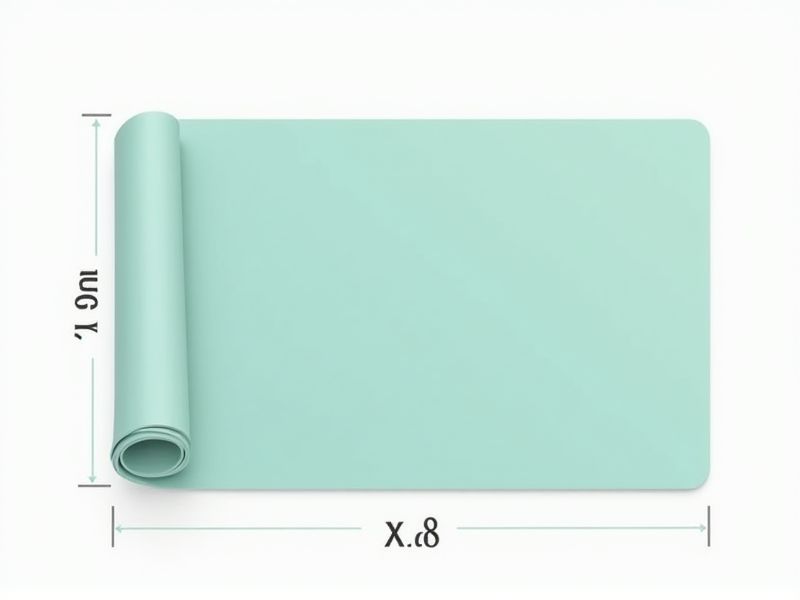
The standard dimensions of a yoga mat are typically around 68 inches (173 cm) in length and 24 inches (61 cm) in width. This size provides enough space for most people to perform a variety of poses comfortably. If you are taller, there are longer options available, usually up to 72 or 74 inches. When choosing a mat, also consider thickness--standard mats are about 1/8 inch (3 mm) thick, which offers a balance between support and portability.
Length: 68 Inches
A standard yoga mat typically measures 68 inches in length, providing ample space for a comfortable practice. This length is ideal for most practitioners, allowing sufficient room for various poses without feeling constrained. Width often ranges from 24 inches, ensuring adequate support and balance during your sessions. When choosing a yoga mat, consider factors such as thickness and material, as these can greatly impact your overall experience and comfort during yoga.
Width: 24 Inches
A standard yoga mat typically measures 24 inches in width, providing ample space for diverse poses and movements. This width accommodates various body types, offering stability and comfort during practice. With a standard length of 68 to 72 inches, the mat ensures that practitioners have enough room to stretch and flow without feeling confined. Choosing a yoga mat with a 24-inch width can enhance your experience by allowing for better positioning and balance during workouts.
Thickness: 1/8 Inch
A standard yoga mat typically features a thickness of 1/8 inch (approximately 0.32 centimeters), striking a balance between support and stability. This thickness offers a sufficient cushioning effect for comfort during various poses while maintaining ground connection for better balance and alignment. A 1/8 inch mat is advantageous for practitioners who prefer more stability in their practice, particularly in styles like hatha or vinyasa. If you seek a mat that combines portability and effective cushioning, consider the 1/8 inch option for an optimal yoga experience.
Travel Mat: 1/16 Inch
A travel yoga mat typically measures 1/16 inch in thickness, making it ultra-portable and lightweight for easy transport. This thin design allows for flexibility and convenience, particularly for practitioners who are on the go. While thinner than standard yoga mats, which generally range from 1/8 to 1/4 inch, a 1/16 inch mat still provides adequate grip for various yogic practices. When choosing your travel mat, consider its material, texture, and slip resistance to ensure a secure workout experience wherever you are.
Extra-Long: 72-74 Inches
An extra-long yoga mat typically measures between 72 and 74 inches, providing ample space for individuals taller than average to practice comfortably. This extended length ensures that you can fully stretch without your hands or feet touching the floor's edge, enhancing your overall experience. Many brands also feature a width of 24 inches, offering generous side-to-side space, which is ideal for various poses and movements. A high-quality extra-long mat often includes extra cushioning, made from durable materials like TPE or PVC, ensuring better grip and support during your yoga sessions.
Wide Mats: 26-30 Inches
Wide yoga mats, ranging from 26 to 30 inches in width, provide enhanced stability and comfort during practice. This increased surface area accommodates various poses, allowing for greater freedom of movement, especially in balancing and stretching exercises. With a thickness that typically ranges from 4 to 6 millimeters, these mats also offer additional cushioning for your joints. When selecting a wide mat, consider options with non-slip textures to enhance grip during your workouts.
Weight: 2-5 Pounds
A standard yoga mat typically weighs between 2 to 5 pounds, striking a balance between portability and stability for various practices. Mats on the lower end of this weight spectrum, around 2 pounds, are ideal for those who prioritize easy transportation, while heavier mats, closer to 5 pounds, provide additional firmness and support. Most mats are made from materials like PVC, TPE, or natural rubber, impacting weight, durability, and eco-friendliness. When choosing your yoga mat, consider how its weight will affect your practice and mobility during classes or home sessions.
Material: Pvc Or Rubber
A high-quality yoga mat typically utilizes either PVC or rubber as its primary material, each offering unique benefits. PVC mats are known for their durability, affordability, and excellent grip, making them suitable for various yoga styles, including hot yoga. In contrast, rubber mats provide a more eco-friendly option, offering superior cushioning and traction while being biodegradable; these mats tend to be favored by those seeking sustainability in their practice. When selecting a mat, consider factors such as thickness--usually between 4mm to 6mm--and the type of surface texture to enhance your comfort and stability during yoga sessions.
Texture: Grippy Surface
A high-quality yoga mat features a grippy surface that enhances stability and prevents slips during practice. Textured materials, such as natural rubber or high-density PVC, are commonly used to achieve this essential characteristic. A mat with a 2 to 4 mm thickness typically balances both comfort and grip, allowing you to maintain your poses securely. Selecting a yoga mat with a superior texture can significantly improve your performance and overall experience, especially during intense workouts.
Eco-Friendly Options: Tpe Or Jute
When considering the standard of yoga mats, eco-friendly options such as Thermoplastic Elastomer (TPE) and jute stand out due to their sustainability. TPE mats are non-toxic, 100% recyclable, and free from harmful chemicals, making them a safe choice for both you and the environment. Jute mats, made from biodegradable natural fibers, are not only highly durable but also provide excellent grip and cushioning during practice. With the global yoga market valued at approximately $80 billion, investing in an eco-friendly mat can contribute to a greener planet while enhancing your yoga experience.
